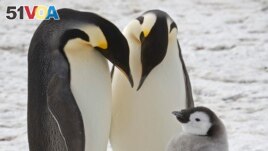28 January 2024
Scientists have found four groups of emperor penguins in Antarctica that they did not know about before. These groups, called "colonies," were found with new satellite images.
Emperor penguins are the world's largest penguins, sea birds that cannot fly but that swim. They are consider "near threatened." This means the animals might have reduced numbers or live in fewer areas than before.
The penguins raise their babies, called chicks, during the Antarctic winter on areas of frozen sea ice. If the ice breaks up before the chicks grow up, many of the chicks might die.

This undated photo provided by the British Antarctic Survey in January 2024 shows adult emperor penguins with a chick near Halley Research Station in Antarctica. (British Antarctic Survey via AP)
Recently released research says that some of the penguins are moving away from their old colonies.
Peter Fretwell is a researcher at the British Antarctic Survey, a government organization. He said that conditions at one colony had become more dangerous since 2016. As a result, the colony near Halley Bay seems to have moved about 30 kilometers east.
He said, "Emperor penguins have taken it upon themselves to try to find more stable sea ice."
Fretwell said that the four new colonies have likely existed for years, but scientists have just recently seen them. They are small colonies with less than 1000 pairs of penguins, Fretwell said.
Scientists have identified 66 emperor penguin colonies and fewer than 300,000 breeding pairs. The four newly found colonies do not change population estimates for the birds very much. However, Fretwell said the fact that one of the colonies moved helps scientists to understand where the birds are going.
Daniel Zitterbart is a penguin researcher at the Woods Hole Oceanographic Institution in the U.S. eastern state of Massachusetts. He was not involved in the study of the newly found penguins. But he said that it is unclear if the new groups broke away from the larger colonies.
Zitterbart said that the places where the penguins reproduce are changing and that, as the world warms, more "penguins will be on the move."
I'm Faith Pirlo.
Christina Larson reported this story for the Associated Press. Faith Pirlo adapted it for VOA Learning English.
_________________________________________________
Words in This Story
colonies – n. groups of plants or animals living or growing in one place
stable – adj. remain the same
pair – n. two of something
breed – v. to produce and raise young
reproduce – v. to produce offspring by sexual reproduction